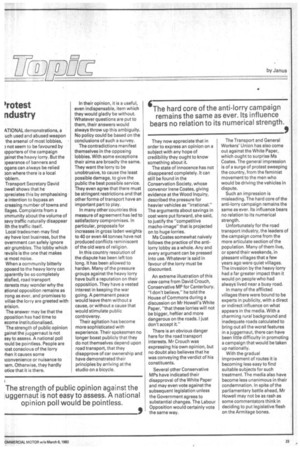Protest ndustry
Page 15

If you've noticed an error in this article please click here to report it so we can fix it.
ATIONAL demonstrations, a uch used and abused weapon the arsenal of most lobbies, ) not seem to be favoured by ipporters of the campaign lainst the heavy lorry. But the Dpearance of banners and ogans can always be relied on where there is a local
Transport Secretary David owell shows that he
)preciates this by emphasising ie intention to bypass an creasing number of towns and lieges. Complaints from a )mmunity about the volume of Davy traffic naturally disappear .ith the traffic itself.
Local tradesmen may find ley have lost business, but the overnment can safely ignore leir grumbles. The lobby which revails is the one that makes le most noise.
When a community bitterly pposed to the heavy lorry can pparently be so completely 3tisfied, road transport
iterests may wonder why the ational opposition remains as Tong as ever, and promises to vilise the lorry are greeted with: erision.
The answer may be that the pposition has had time to ecome institutionalised. The strength of public opinion gainst the juggernaut is not asy to assess. A national poll rould be pointless. People are lost conscious of the lorry Olen it causes some iconvenience or nuisance to lem. Otherwise, they hardly otice that it is there. In their opinion, it is a useful, even indispensable, item which they would gladly be without. Whatever questions are put to them, their answers would always throw up this ambiguity. No policy could be based on the conclusions of such a survey.
The contradictions manifest themselves in the opposing lobbies. With some exceptions their aims are broadly the same. They want the lorry to be unobtrusive, to cause the least possible damage, to give the public the best possible service. They even agree that there must be stringent restrictions and that other forms of transport have an important part to play.
In many other countries this measure of agreement has led to satisfactory compromises. In particular, proposals for increases in gross laden weights to 40 or even 44 tonnes have not produced conflicts reminiscent of the old wars of religion.
In this country resolution of the dispute has been left too long. It has been allowed to harden. Many of the pressure groups against the heavy lorry have built a reputation on their opposition. They have a vested interest in keeping the war going. A permanent peace would leave them without a cause, or without a cause that would stimulate public controversy.
Their agitation has become more sophisticated with experience. Their spokesmen no longer boast publicly that they do not themselves depend upon road transport, that they disapprove of car ownership and have demonstrated their principles by arriving at the studio on a bicycle. They now appreciate that in order to express an opinion on a subject with any hope of credibility they ought to know something about it.
The state of innocence has not disappeared completely. It can still be found in the Conservation Society, whose convenor Irene Coates, giving evidence at the Wood Inquiry, described the pressure for heavier vehicles as "irrational." The arguments about savings in cost were put forward, she said, to justify the "competitive macho-image" that is projected on to huge lorries.
Ms Coates somewhat naively follows the practice of the antilorry lobby as a whole. Any and every argument can be pressed into use. Whatever is said in favour of the lorry must be discounted.
An extreme illustration of this view came from David Crouch, Conservative MP for Canterbury. "I don't believe," he told the House of Commons during a discussion on Mr Howell's White Paper, "that these lorries will not be bigger, heftier and more dangerous on the roads.1 just don't accept it."
There is an obvious danger here for the road transport interests. Mr Crouch was expressing his own opinion, but no doubt also believes that he was conveying the verdict of his constituents.
Several other Conservative MPs have indicated their disapproval of the White Paper and may even vote against the subsequent legislation unless the Government agrees to substantial changes. The Labour Opposition would certainly vote the same way. The Transport and General Workers' Union has also come out against the White Paper, which ought to surprise Ms Coates. The general impression is of a surge of protest sweeping the country, from the feminist movement to the men who would be driving the vehicles in dispute.
Such an impression is misleading. The hard core of the anti-lorry campaign remains the same as ever. Its influence bears no relation to its numerical strength.
Unfortunately for the road transport industry, the leaders of the campaign come from the more articulate section of the population. Many of them live, or spend their weekends, in pleasant villages that a few years ago were quiet villages. The invasion by the heavy lorry had a far greater impact than it would f on people who had always lived near a busy road.
In many of the afflicted villages there were bound to be experts in publicity, with a direct or indirect influence on what appears in the media. With a charming rural background and inadequate roads calculated to bring out all the worst features in a juggernaut, there can have been little difficulty in promoting a campaign that would be taken up nationally.
With the gradual improvement of routes it is becoming less easy to find suitable subjects for such treatment. The media also have become less unanimous in their condemnation. In spite of the parliamentary battle ahead, Mr Howell may not be as rash as some commentators think in deciding to put legislative flesh on the Armitage bones.
































































